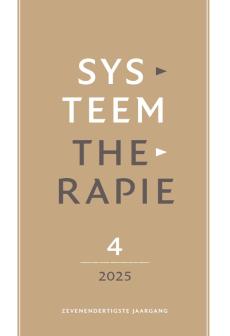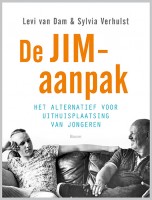Onderzoek naar parentificatie – Context, constituerende factoren en consequenties
Literatuur
- Aldridge, J. (2006). The experiences of children living with and caring for parents with mental illness. Child Abuse Review, 15(2), 79-88.
- Aldridge, J. (2008). All work and no play? Understanding the needs of children with caring responsibilities. Children & Society, 22(4), 253-264.
- Alexander, P. C., Teti, L., & Anderson, C. L. (2000). Childhood sexual abuse history and role reversal in parenting. Child Abuse & Neglect, 24(6), 829-838.
- Boszormenyi-Nagy, I., & Spark, G. M. (1973). Invisible loyalties – Reciprocity in intergenerational family therapy. New York: Brunner/Mazel.
- Boszormenyi-Nagy, I., & Krasner, B. R. (1994). Tussen geven en nemen – Over contextuele therapie (3e druk). Haarlem: De Toorts.
- Burnett, G., Jones, R. A., Bliwise, N. G., & Ross, L. T. (2007). Family unpredictability, parental alcoholism, and the development of parentification. The American Journal of Family Therapy, 34(3), 181-189.
- Burton, L. (2007). Childhood adultification in economically disadvantaged families – A conceptual model. Family Relations, 56(4), 329-345.
- Byng-Hall, J. (2002). Relieving parentified children’s burdens in families with insecure attachment patterns. Family Process, 41(3), 375-388.
- Byng-Hall, J. (2008). The significance of children fulfilling parental roles – Implications for family therapy. Journal of Family Therapy, 30(2), 147–162.
- Carroll, J. J., & Robinson, B. E. (2000). Depression and parentification among adults as related to parental workaholism and alcoholism. The Family Journal – Counseling and Therapy for Couples and Families, 8(4), 360-367.
- Castro, D. M., Jones, R. A., & Mirsalimi, H. (2004). Parentification and the impostor phenomenon – An empirical investigation. The American Journal of Family Therapy, 32, 205-216.
- Champion, J. E., Jaser, S. S., Reeslund, K. L., Simmons, L., Potts, J. E., Shears, A. R., & Compas, B. E. (2009). Caregiving behaviours by adolescent children of mothers with and without a history of depression. Journal of Family Psychology, 23, 156-166.
- De Mol, J., & Verhofstadt, L. L. (2011). Interafhankelijkheid in gezinnen – Hoe onderzoeken we dat eigenlijk? Systeemtherapie, 23(3), 167-174.
- Earley, L., & Cushway, D. (2002). The parentified child. Clinical Child Psychology and Psychiatry, 7(2), 163-178.
- Earley, L., Cushway, D., & Cassidy, T. (2007). Children’s perceptions and experiences of care giving – A focus group study. Counselling Psychology Quarterly, 20(1), 69-80.
- East, P. L. (2010). Children’s provision of family caregiving – Benefit or burden? Developmental Perspectives, 4(1), 55-61.
- Evans, R., & Thomas, F. (2009). Emotional interactions and an ethics of care – Caring relations in families affected by HIV and AIDS. Emotion, Space and Society, 2(2), 111-119.
- Fitzgerald, M. M., Salstrom, S., Jackson, J., Schneider, R. A., Zinzow, H. M., & Fossel, R. V. (2008). Child sexual abuse, early family risk, and childhood parentification – Pathways to current psychosocial adjustment. Journal of Family Psychology, 22(2), 320-324.
- Godsall, R. E., Jurkovic, G. J., Emshoff, J., Anderson, L., & Stanwyck, D. (2004). Why some kids do well in bad situations – Relation of parental alcohol misuse and parentification to children’s self-concept. Substance Use & Misuse, 39(5), 789-809.
- Hooper, L., Marotta, S. A., & Lanthier, R. P. (2008). Predictors of growth and distress following childhood parentification – A retrospective exploratory study. Journal of Child and Family Studies, 17, 693–705.
- Hooper, L. (2007). The application of attachment theory and family systems theory to the phenomena of parentification. The Family Journal – Counseling and Therapy for Couples and Families, 15(3), 217-223.
- Hooper, L., DeCoster, J., White, N., & Voltz, M. L. (2011). Characterizing the magnitude of the relation between self-reported childhood parentification and adult psychopathology – A meta-analysis. Journal of Clinical Psychology, 67(10), 1028-1043.
- Jacobvitz, D., Hazen, N., Curran, M., & Hitchens, K. (2004). Observations of early triadic family interactions – Boundary disturbances in the family predict symptoms of depression, anxiety, and attention-deficit hyperactivity disorder in middle childhood. Development & Psychopathology, 16(3), 577-592.
- Jones, R., & Wells, M. (1996). An empirical study of parentification and personality. The American Journal of Family Therapy, 24(2), 145–152.
- Jurkovic, G. J. (1997). Lost Childhoods – The plight of the parentified child. New York: Brunner/Mazel.
- Jurkovic, G. J., Kuperminc, G. P., Sarac, T., & Weisshaar, D. (2005). Role of filial responsibility in the post-war adjustment of Bosnian young adolescents. Journal of Emotional Abuse, 5(4), 219-235.
- Jurkovic, G. J., & Thirkield, A. (1999). Filial Responsibility Scale–Adult (Available from Gregory J. Jurkovic, Department of Psychology, MSC2A1155, 33 Gilmer ST.SE Unit 2, Atlanta, GA 30303-3080 or gjurkovic@gsu.edu).
- Jurkovic, G. J., Thirkield, A., & Morrell, R. (2001). Parentification of adult children of divorce – A multidimensional analysis. Journal of Youth and Adolescence, 30(2), 245-257.
- Katz, J., Petracca, M., & Rabinowitz, J. (2009). A retrospective study of daughters’ emotional role reversal with parents, attachment anxiety, excessive reassurance-seeking, and depressive symptoms. The American Journal of Family Therapy, 37, 185–195.
- Kroll, B. (2004). Living with an elephant – Growing up with parental substance misuse. Child and Family Social Work, 9(2), 129-140.
- Kuczynski, L. (2003). Handbook of dynamics in parent-child relations. Thousand Oaks, CA: Sage.
- Kuczynski, L., & Parkin, M. (2007). Agency and bidirectionality in socialization – Interactions, transactions, and relational dialectics. In J. E. Grusec & P. Hastings (eds.), Handbook of socialization (pp. 259-283). New York: Guilford.
- Macfie, J., Houts, R. M., McElwain, N. L., & Cox, M. J. (2005). The effect of father-toddler and mother-toddler role reversal on the development of behaviour problems in kindergarten. Social Development, 14(3), 514-531.
- Macfie, J., McElwain, N. L., Houts, R. M., & Cox, M. J. (2005). Intergenerational transmission of role reversal between parent and child – Dyadic and family systems internal working models. Attachment & Human Development, 7(1), 51-56.
- McMahon, T. J., & Luthar, S. S. (2007). Defining characteristics and potential consequences of caretaking burden among children living in urban poverty. American Journal of Orthopsychiatry, 77(2), 267-281.
- Minuchin, S., Montalvo, B., & Guerney, B. G. (1967). Families of the slums – An exploration of their structure and treatment. New York: Basic Books.
- Moore, T., McArthur, M., Noble-Carr, D. (2011). Different but the same? Exploring the experiences of young people caring for a parent with an alcohol or other drug issue. Journal of Youth Studies, 14(2), 161-177.
- Moss, E., Cyr, C., & Dubois-Comtois, K. (2004). Attachment at early school age and developmental risk – Examining family contexts and behaviour problems of controlling-caregiving, controlling-punitive, and behaviorally disorganized children. Developmental Psychology, 40(4), 519-532.
- Pakenham, K. I., Bursnall, S., Chiu, J., Cannon, T., & Okochi, M. (2006). The psychosocial impact of caregiving on young people who have a parent with an illness or disability – Comparisons between young caregivers and noncaregivers. Rehabilitation Psychology, 51(2), 113-126.
- Peris, T. A., Goecke-Morey, M. C., Cummings, E. M., & Emery, R. E. (2008). Marital conflict and support seeking by parents in adolescence – Empirical support for the parentification construct. Journal of Family Psychology, 22(3), 633-642.
- Rose, H. D., & Cohen, K. (2010). The experiences of young carers – A meta-synthesis of qualitative findings. Journal of Youth Studies, 13(4), 473-487.
- Stein, J. A., Rotheram-Borus, M. J., & Lester, P. (2007). Impact of parentification on long-term outcomes among children of parents with HIV/AIDS. Family Process, 46, 317-333.
- Van Parys, H., & Rober, P. (2012). Trying to comfort the parent – A qualitative study of children dealing with parental depression. Journal of Marital and Family Therapy (published on line, doi: 10.1111/j.1752-0606.2012.00304.x).
- Wells, M., Glickauf-Hughes, C., & Jones, R. A. (1999). Codependency – A grass roots construct’s relationship to shame-proneness, low self-esteem, and childhood parentification. The American Journal of Family Therapy, 27, 63-71.
- Wells, M., & Jones, R. A. (1998). Relationship among childhood parentification, splitting, and dissociation – Preliminary findings. The American Journal of Family Therapy, 26, 331-339.
- Wells, M., & Jones, R. A. (2000). Childhood parentification and shame-proneness – A preliminary study. The American Journal of Family Therapy, 28, 19-27.
- West, M. L., & Keller, A. E. R. (1991). Parentification of the child – A case study of Bowlby’s compulsive care-giving attachment pattern. American Journal of Psychotherapy, 65(3), 425-431.
- Williams, K., & Francis, S. (2010). Parentification and psychological adjustment – Locus of control as a moderating variable. Contemporary Family Therapy, 32(3), 31-37
 © 2009-2026 Uitgeverij Boom Amsterdam
© 2009-2026 Uitgeverij Boom Amsterdam
ISSN 0924-3631
De artikelen uit de (online)tijdschriften van Uitgeverij Boom zijn auteursrechtelijk beschermd. U kunt er natuurlijk uit citeren (voorzien van een bronvermelding) maar voor reproductie in welke vorm dan ook moet toestemming aan de uitgever worden gevraagd:
Behoudens de in of krachtens de Auteurswet van 1912 gestelde uitzonderingen mag niets uit deze uitgave worden verveelvoudigd, opgeslagen in een geautomatiseerd gegevensbestand, of openbaar gemaakt, in enige vorm of op enige wijze, hetzij elektronisch, mechanisch door fotokopieën, opnamen of enig andere manier, zonder voorafgaande schriftelijke toestemming van de uitgever.
Voor zover het maken van kopieën uit deze uitgave is toegestaan op grond van artikelen 16h t/m 16m Auteurswet 1912 jo. Besluit van 27 november 2002, Stb 575, dient men de daarvoor wettelijk verschuldigde vergoeding te voldoen aan de Stichting Reprorecht te Hoofddorp (postbus 3060, 2130 KB, www.reprorecht.nl) of contact op te nemen met de uitgever voor het treffen van een rechtstreekse regeling in de zin van art. 16l, vijfde lid, Auteurswet 1912.
Voor het overnemen van gedeelte(n) uit deze uitgave in bloemlezingen, readers en andere compilatiewerken (artikel 16, Auteurswet 1912) kan men zich wenden tot de Stichting PRO (Stichting Publicatie- en Reproductierechten, postbus 3060, 2130 KB Hoofddorp, www.cedar.nl/pro).
No part of this book may be reproduced in any way whatsoever without the written permission of the publisher.
Nieuwsbrief Boom Psychologie
Meld u nu aan en ontvang maandelijks de Boom Psychologie nieuwsbrief met aantrekkelijke aanbiedingen en de nieuwe uitgaven.
Aanmelden



